While the sector has struggled to contend with scything cuts in core funding from the Arts Council of Northern Ireland (ACNI), chinks of light have gleamed from other sources. This has been the first year in the Decade of Centenaries – the official acknowledgement of significant anniversaries from 1912 to 1922 by the Northern Ireland Assembly, under the auspices of the Departments of Culture, Arts and Leisure and Enterprise, Trade and Industry. The Northern Ireland Tourist Board’s ni2012 Our Time Our Place marketing campaign actively promoted a year of cultural festivities and anniversaries in the region. And the London Cultural Olympiad 2012 cast its net across the Irish Sea. These additional funding streams have generated a number of commissions for a raft of new work, large-scale productions and smaller history-based dramas.
Over and above all else, 2012 has been the year of Titanic. The 100th anniversary of the sinking of the iconic White Star Line vessel was commemorated by the Belfast Titanic Festival, whose extensive programme contained a new play for the Lyric Theatre and two new pieces by Kabosh, which has maintained its high output of site-specific work throughout the year.
White Star of the North by Rosemary Jenkinson was commissioned by the Belfast Titanic Society, in association with the Lyric, and incorporated the centenaries of two significant events in Northern Ireland’s history - the signing of the Ulster Covenant and the Titanic tragedy. Directed by Des Kennedy, it subsequently transferred to Clwyd Theatr Cymru in North Wales.
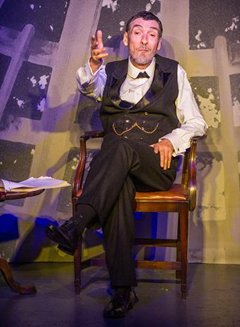 Kabosh’s festival contribution comprised two pieces, sharply contrasting in scale, style and content. Titans by Jimmy McAleavey led audiences on a mysterious nocturnal quest through the glass and steel interior of the spectacular Titanic Signature Building. Meanwhile, in the atmospheric surroundings of the Belfast Barge John Wilson Foster’s A Better Boysaw Lalor Roddy assume the role of captain of industry Lord Pirrie and quietly reflect on the life of Thomas Andrews, chief designer of RMS Titanic.
Kabosh’s festival contribution comprised two pieces, sharply contrasting in scale, style and content. Titans by Jimmy McAleavey led audiences on a mysterious nocturnal quest through the glass and steel interior of the spectacular Titanic Signature Building. Meanwhile, in the atmospheric surroundings of the Belfast Barge John Wilson Foster’s A Better Boysaw Lalor Roddy assume the role of captain of industry Lord Pirrie and quietly reflect on the life of Thomas Andrews, chief designer of RMS Titanic.
One of the year’s outstanding events was the glossy opening of The MAC, the £18 million multi-purpose arts hub in the heart of Belfast’s Cathedral Quarter. It got off to a flying start in April with Titanic (Scenes from the British Wreck Commissioner’s Inquiry, 1912), a handsome, large-scale piece of verbatim theatre, for which original witness statements were curated and stitched together by Owen McCafferty. It was skilfully directed by Charlotte Westenra, an established expert in the genre and featured an excellent cast, a magnificent set by Richard Kent and a climactic segment by McCafferty at his lyrical best.
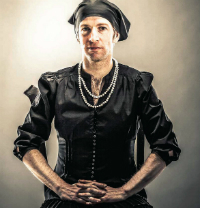 The MAC has rapidly established itself as one of the city’s favourite gathering places. It has forged creative partnerships with leading independent companies, resulting in co-productions with ponydance (Straight to DVD) and Bruiser (Sweet Charity), as well as with Cahoots NI, whose Christmas world premiere of The Incredible Book Eating Boy unites three outstanding local talents - artist/illustrator Oliver Jeffers, composer Conor Mitchell and director/illusionist Paul Bosco McEneaney. I Am My Own Wife, directed by Prime Cut's artistic director Emma Jordan, featured a spellbinding solo performance by John Cronin, as well as a visually thrilling final moment, cleverly incorporated into Ciaran Bagnall's lush, evocative design. Over a weekend in June, the Pick’n’Mix Festival – founded in 2007 at The MAC’s former home, the Old Museum Arts Centre - again proved a hugely successful showcase for new work and emerging companies.
The MAC has rapidly established itself as one of the city’s favourite gathering places. It has forged creative partnerships with leading independent companies, resulting in co-productions with ponydance (Straight to DVD) and Bruiser (Sweet Charity), as well as with Cahoots NI, whose Christmas world premiere of The Incredible Book Eating Boy unites three outstanding local talents - artist/illustrator Oliver Jeffers, composer Conor Mitchell and director/illusionist Paul Bosco McEneaney. I Am My Own Wife, directed by Prime Cut's artistic director Emma Jordan, featured a spellbinding solo performance by John Cronin, as well as a visually thrilling final moment, cleverly incorporated into Ciaran Bagnall's lush, evocative design. Over a weekend in June, the Pick’n’Mix Festival – founded in 2007 at The MAC’s former home, the Old Museum Arts Centre - again proved a hugely successful showcase for new work and emerging companies.
.jpg.aspx%3Fwidth=300&height=191) Theatre for the younger generation continues to thrive, with Cahoots NI and Replay leading the charge. Replay has developed and produced a slate of cutting-edge performance pieces for babies, toddlers and young people with profound learning difficulties, as well as a schools project between Belfast and Sarajevo based around Charles Way’s award-winning play Red Red Shoes (currently in development) and A Boy & his Box, a pop-up Christmas show in Belfast city centre. And artistic director Anna Newell’s production of Marianne Dreams, adapted by Moira Buffini, was cheered by critics and audiences alike.
Theatre for the younger generation continues to thrive, with Cahoots NI and Replay leading the charge. Replay has developed and produced a slate of cutting-edge performance pieces for babies, toddlers and young people with profound learning difficulties, as well as a schools project between Belfast and Sarajevo based around Charles Way’s award-winning play Red Red Shoes (currently in development) and A Boy & his Box, a pop-up Christmas show in Belfast city centre. And artistic director Anna Newell’s production of Marianne Dreams, adapted by Moira Buffini, was cheered by critics and audiences alike.
The Lyric launched into 2012 with a revival of Brian Friel’s version of Chekhov’s Uncle Vanyaby a creative team led by director Mick Gordon and actor Conleth Hill. Gordon’s pared-down production not only captured the essence and shared vision of these two master playwrights but also provided Hill with the opportunity to return home briefly from London and deliver a remarkable performance in a role he was born to play.
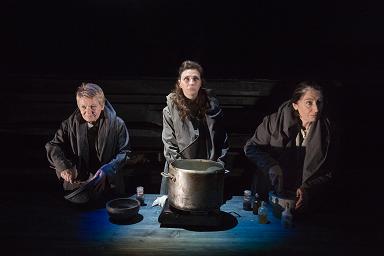 Conall Morrison returned to the same space where he notched up five of this year’s Irish Times Irish Theatre Awards nominations for the Lyric’s inaugural production of The Crucible - two of which resulted in the top honours, including that for best director. In September he revisited The Playboy of the Western World, which he described as ‘a mad maelstrom of music, drink, mayhem and violence’. Designed by Monica Frawley, with Patrick Moy as Christy Mahon and Orla Fitzgerald as Pegeen Mike, this large-scale production had Morrison’s hallmark style of intense physicality stamped all over it. In common with Lynne Parker’s Macbeth, which followed it onto the Lyric’s main stage, the cast included young professional actors, recent graduates of the Lyric Drama Studio, who also delivered a series of schools workshops under an internship scheme funded by the Queen’s Silver Jubilee Trust.
Conall Morrison returned to the same space where he notched up five of this year’s Irish Times Irish Theatre Awards nominations for the Lyric’s inaugural production of The Crucible - two of which resulted in the top honours, including that for best director. In September he revisited The Playboy of the Western World, which he described as ‘a mad maelstrom of music, drink, mayhem and violence’. Designed by Monica Frawley, with Patrick Moy as Christy Mahon and Orla Fitzgerald as Pegeen Mike, this large-scale production had Morrison’s hallmark style of intense physicality stamped all over it. In common with Lynne Parker’s Macbeth, which followed it onto the Lyric’s main stage, the cast included young professional actors, recent graduates of the Lyric Drama Studio, who also delivered a series of schools workshops under an internship scheme funded by the Queen’s Silver Jubilee Trust.
In a year which saw renewed interest in the plays of Oscar Wilde, Graham McLaren’s exuberant, tongue-in-cheek production of The Importance of Being Earnest for the Lyric was widely enjoyed. Last month, Bruiser bounced back into familiar ensemble mode with an entertaining, music-hall styled updating of Lady Windermere’s Fanat The MAC, adapted by PJ O’Reilly, directed by Lisa May and designed by Diana Ennis. And Portstewart-based Big Telly celebrated its 25th birthday with the premiere of Nicola McCartney’s highly original adaptation of Charles Maturin’s Melmoth the Wanderer, frequently labelled the first-ever horror novel.
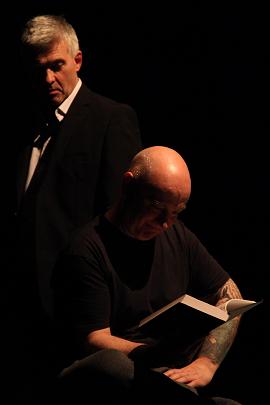 One of the year’s most intriguing events was the emergence of a new play by Gary Mitchell, who, until suddenly finding himself out of fashion a few years ago, had been one of the most garlanded and sought-after writers in these islands. Raised in Belfast’s loyalist Rathcoole estate, he had been burned out of his home by individuals who objected to the filming of one of his fearless portrayals of violence within that community. Ironically, the invitation to return to the fold was issued by the Irish language company Aisling Ghear, which commissioned Love Matters, a hard-edged domestic drama, opening in An Culturlann on the Falls Road and touring to the Lyric and the Project Arts Centre in Dublin.
One of the year’s most intriguing events was the emergence of a new play by Gary Mitchell, who, until suddenly finding himself out of fashion a few years ago, had been one of the most garlanded and sought-after writers in these islands. Raised in Belfast’s loyalist Rathcoole estate, he had been burned out of his home by individuals who objected to the filming of one of his fearless portrayals of violence within that community. Ironically, the invitation to return to the fold was issued by the Irish language company Aisling Ghear, which commissioned Love Matters, a hard-edged domestic drama, opening in An Culturlann on the Falls Road and touring to the Lyric and the Project Arts Centre in Dublin.
Writer-producer Martin Lynch’s two companies Green Shoot and GBL had a busy year. Fly Me to the Moon, a black comedy about two care workers, proved yet another popular success for Marie Jones. But on a completely different tack came the first two plays in the Ulster Trilogy, which focuses on contemporary political life in Northern Ireland. Brothers in Arms by ex-prisoner Sam Millar examined the schisms within republicanism and fuelled widespread discussion and dissent. Lynch then pulled off something of a coup by signing up the distinguished Los Angeles-based Belfast-born writer Ron Hutchinson. His semi-autobiographical Paisley & Me, premiered at the 50th Belfast Festival at Queen’s, is a play about Protestant identity, in which the iconic firebrand cleric, played by Dan Gordon, uncharacteristically occupies a supporting role.
Men coming to terms with the legacies of their past was the theme of Release, the third Theatre of Witness production, directed by Teya Sepinuck, the American founder of this remarkable, life-changing project, and produced by The Playhouse in Derry and the Holywell Trust. Six men – a former RUC detective, a former prison governor, a former British soldier, an ex-prisoner, a former paramilitary and a community activist – stepped out on stage to share painful, personal journeys of reconciliation and healing. And speaking of Derry … just this month, the first event in The Playhouse’s programme for Derry-Londonderry UK City of Culture 2013 saw the long awaited re-emergence of Field Day. Fourteen years after its last theatre production, the company, which, at the height of the Troubles, established itself as a powerful instrument for cultural, political and intellectual debate, opened the doors into a brave new world, with a double bill of short plays by young up-and-coming writers Clare Dwyer Hogg and David Ireland.
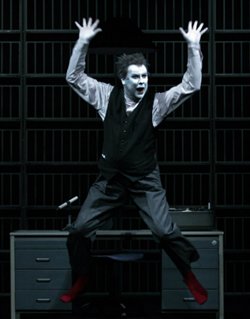 The London Cultural Olympiad was one of several significant bodies which lent financial support to a ground-breaking new festival dedicated to Samuel Beckett. Under the leadership of director and founder Sean Doran, Happy Days unfolded over five days in Enniskillen, the town where Beckett was a schoolboy. Within a thrilling, multi-faceted programme, Pan Pan’s All That Fallinstallation created a lasting impression, while few will forget the idiosyncratic presence of Robert Wilson, making a rare personal appearance in Krapp’s Last Tape.
The London Cultural Olympiad was one of several significant bodies which lent financial support to a ground-breaking new festival dedicated to Samuel Beckett. Under the leadership of director and founder Sean Doran, Happy Days unfolded over five days in Enniskillen, the town where Beckett was a schoolboy. Within a thrilling, multi-faceted programme, Pan Pan’s All That Fallinstallation created a lasting impression, while few will forget the idiosyncratic presence of Robert Wilson, making a rare personal appearance in Krapp’s Last Tape.
While several companies in the independent sector clocked up landmark anniversaries, the year has also seen the long-overdue emergence of a batch of bright young creatives, bursting with forward-looking ideas and approaches. Chatterbox, Green Room, Ruff Theatre, Wireless Mystery Theatre, Staged Assault and Accidental are just some of the names to look out for in the year ahead.
Tinderbox and its dramaturg Hanna Slattne continue to spearhead the development of new writing for the stage while, Accidental, under artistic director Richard Lavery, has also been proactive in this area.
Among several full productions, its Biscuit Tin Readings ran monthly between August and December, while Fast and Loose, described as theatre for the chronically impatient, brought together four writers, four directors and fourteen actors at the Lyric to create four performances in the space of 24 hours.
Funding issues loomed large on the agenda of an all-Ireland theatre conference in June, organised jointly by Northern Ireland Theatre Association (NITA), Audiences NI and Theatre Forum. Some 350 delegates from across the island congregated at the Lyric Theatre in Belfast for an event which one participant described as “… a really valuable opportunity to look beyond our immediate individual problems and see the big picture.”
Given the ongoing and mounting financial pressures - even at the level of statutory bodies like the Arts Council of Northern Ireland, whose funding from central government was drastically reduced - it remains a mystery as to how the sector continues to produce such a high volume of quality work. The past twelve months, however, have been more problematic than even the most experienced practitioners can remember and the general view is that the majority of companies are clinging on by their fingertips.
Conversations are starting as to whether this critical situation can be allowed to continue, whether the time has come to draw a line in the sand and say ‘no more.’ Company managers and artistic directors report spending disproportionate amounts of time on lengthy, complex - and frequently unsuccessful - funding applications. Big Telly even produced a wickedly astute short play about form-filling and box-ticking at Pick’n’Mix. But, as a new year dawns, a palpable spirit of unity in the face of adversity has emerged, a conviction that the sector is immeasurably stronger and more effective as a shared entity than as a random group of single bodies swimming against the tide. It remains to be seen how this collective approach will play out in the face of the challenges that 2013 will inevitably bring.
Jane Coyle is a Belfast-based freelance arts journalist and critic, who contributes to The Irish Times, The Stage, Culture Northern Ireland and BBC Radio Ulster.